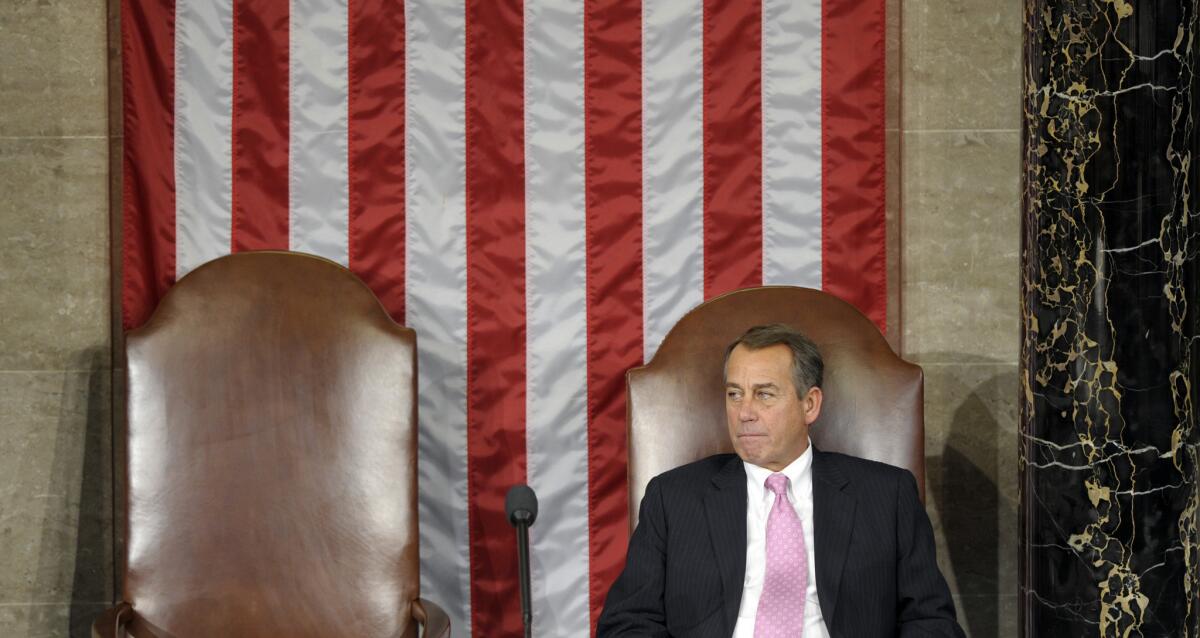McManus: The worst job in Congress

- Share via
Spare a little sympathy, if you can, for John A. Boehner of Ohio, speaker of the House of Representatives.
On paper, he’s the most powerful Republican in the land. In practice, he’s caught between a cliff and a ceiling as the uneasy chairman of an unhappy and fractious caucus.
The “fiscal cliff” melodrama wasn’t kind to Boehner and his party. President Obama won his top priority, an increase in tax rates on the wealthy, without reducing federal spending in return.
For Boehner, the process was even more disastrous than the outcome. The speaker tried to negotiate a deal with the White House, but failed. He proposed a Plan B, but his own party rejected it. In the end, he found himself voting with Nancy Pelosi and her Democrats for an outcome he didn’t like. Then he stumbled one more time, postponing a vote on aid for states ravaged by Superstorm Sandy because he wasn’t sure his caucus would support it.
And now he has to go through a similar process all over again when the federal government runs up against its debt ceiling next month.
It’s no wonder that by Thursday, when Boehner was narrowly reelected as speaker over protest votes from disgruntled conservatives, the sour joke in the Capitol was that his caucus was punishing him for his failings by letting him keep his job.
Two years ago, when he first became speaker, Boehner wept with joy and awe. This year, he wept again, but that may have been out of relief that he needed only one round of votes to keep his job.
This wasn’t how Boehner and his party wanted the new Congress to begin. After 2010’s midterm election, in which a surging tea party movement delivered the House to the GOP, conservatives thought history was on their side. Many expected to win both the White House and a Senate majority in 2012. Instead, a fickle electorate turned in the opposite direction.
As a result, there are now two Republican parties in the House: the conservative pragmatists (call them the Boehner Party) who think voters want them to negotiate and compromise, and the conservative hard-liners (led by Boehner’s deputy, Eric Cantor of Virginia) who think the right answer is to dig in and say no.
That division is what produced last week’s unusual bipartisan vote in favor of the fiscal cliff compromise, in which Boehner and 84 other Republicans joined 172 Democrats to make a majority, while Cantor and 150 other conservatives voted no.
That put the speaker in the uncomfortable position of voting against most of the members of his own caucus.
So why did they reelect him as their leader?
“You don’t change coaches in the middle of the playoffs, even if the coach isn’t running the team the way you’d like,” explained Rep. John Campbell (R-Irvine), one of the hard-liners.
Still, Boehner faces two problems in the new Congress: His GOP majority is smaller than it was last year because of the loss of nine seats in November. And it’s also more conservative, since many of the members who left were moderates.
Of 233 Republicans in the new House, only 15 — fewer than 7% — come from districts that Obama carried in the presidential election, according to statistician David Wasserman of the Cook Political Report. A far greater number come from districts Mitt Romney won handily, which means they represent a very different country from the one that reelected Obama. The political pressure most House Republicans face from their voters isn’t to compromise with Democrats; it’s to resist.
That could bode ill for the coming fight over the debt ceiling.
For one thing, Republicans are in even less of a mood for compromise because they think they have more leverage this time. Instead of defending the wealthy against tax hikes, they’ll be championing cuts in federal spending, a more popular idea (at least in the abstract).
“I hope the speaker understands that he really can’t compromise that way again,” Campbell said. “He has to take a harder line…. But we’re going on faith. There have been no commitments.”
Can the House GOP stay together this time?
Just as in the fight over the fiscal cliff, when automatic tax increases were the price of failure, there will be warnings of economic disaster in this fight too: a government shutdown, defaulted Treasury bills and chaos in the markets.
And White House aides have almost openly proclaimed a goal of repeating the pattern of dividing Boehner’s caucus in two.
It’s too early to predict how the next fight will turn out, but a few forecasts are safe. We will see another bout of political brinkmanship, with plenty of nail-biting right up to the deadline. It won’t likely produce a “grand bargain” that thoroughly reforms the big entitlement programs, Medicare, Medicaid and Social Security. And Boehner won’t be the man leading negotiations with the Democrats. He says he’s through trying to make deals with Obama; it’s brought him nothing but grief. He’s going to concentrate on holding his party together in a challenging time.
Boehner has the job he always wanted. But it came without a guarantee that he’s going to enjoy it much.
Follow Doyle McManus on Twitter @DoyleMcManus
More to Read
Get the L.A. Times Politics newsletter
Deeply reported insights into legislation, politics and policy from Sacramento, Washington and beyond. In your inbox twice per week.
You may occasionally receive promotional content from the Los Angeles Times.











